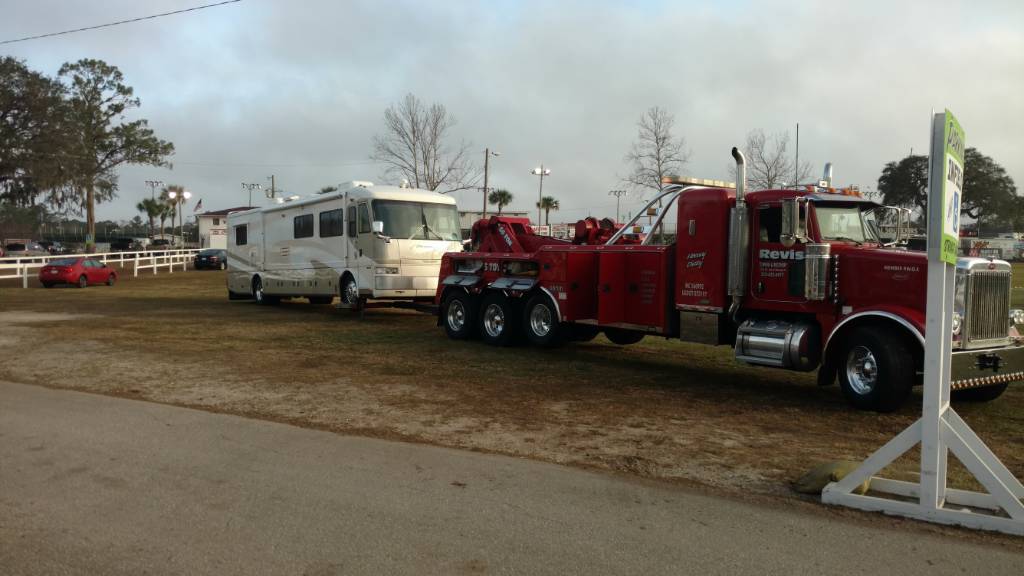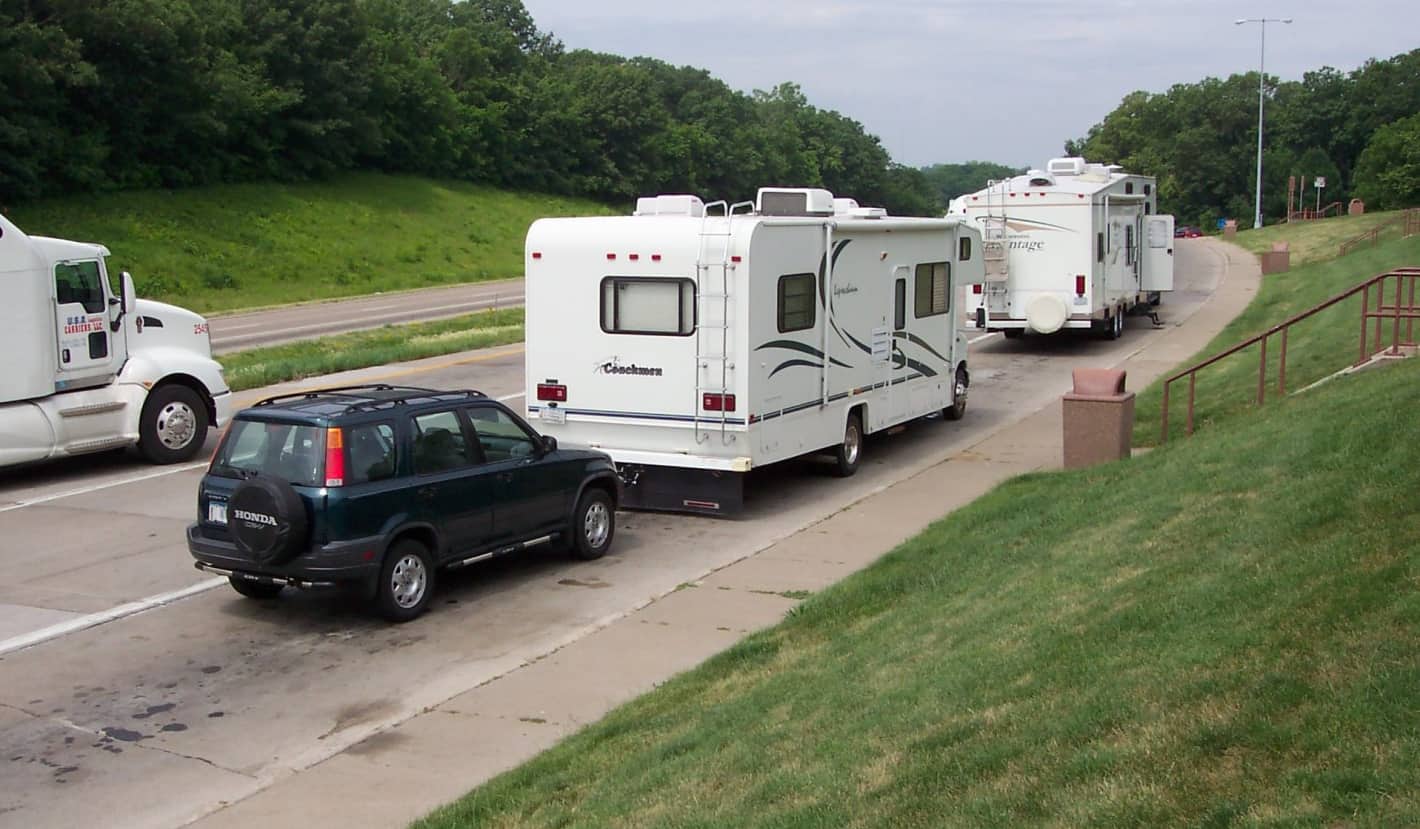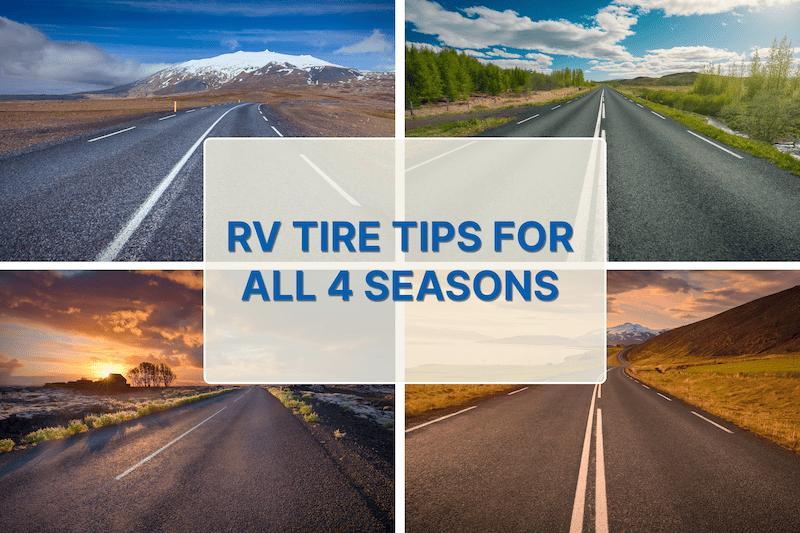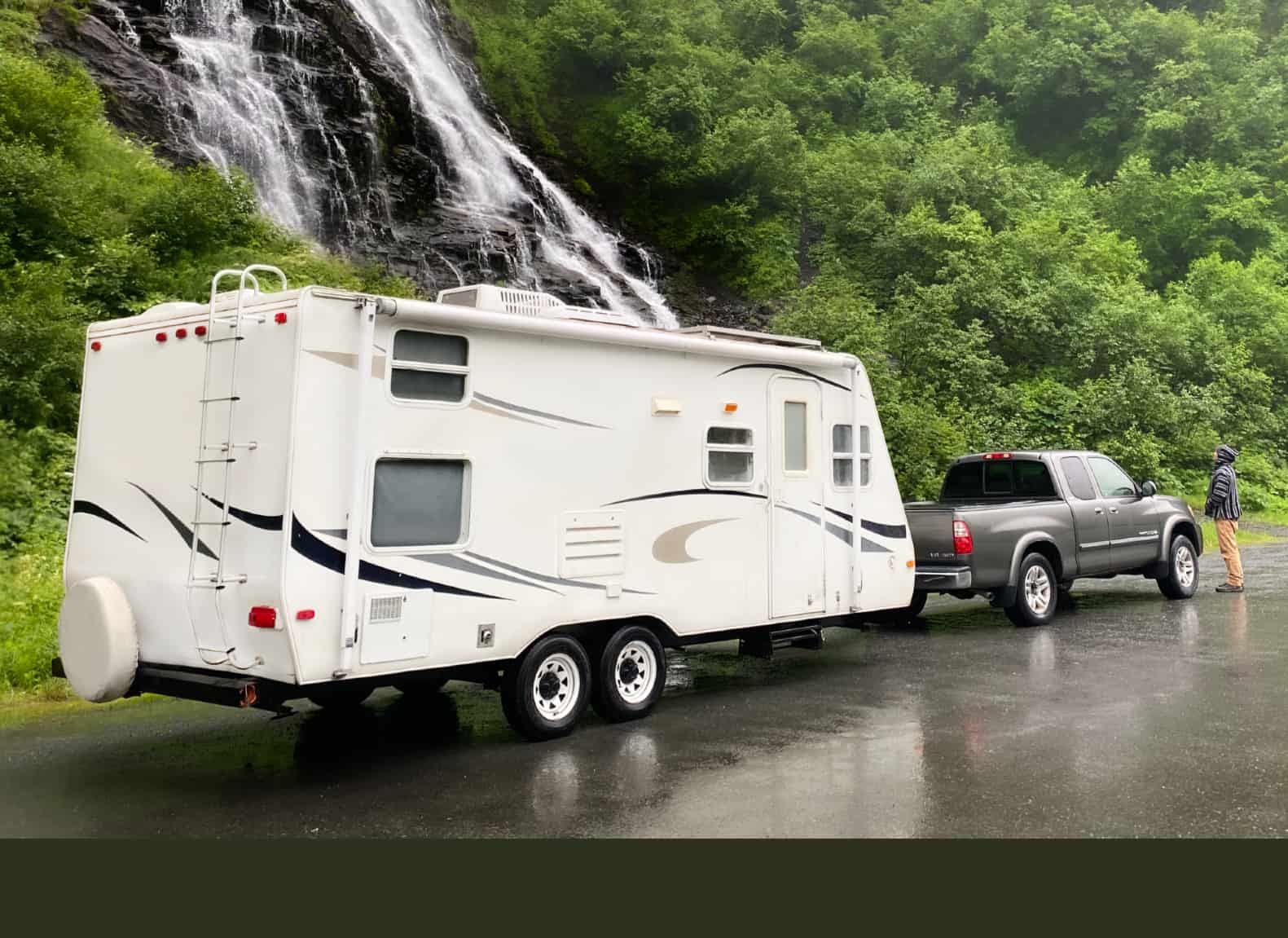Your motorhome breaking down on the side of the road can be a real nightmare. Unlike smaller passenger vehicles, towing a broken motorhome to a shop is no easy task. Chances are, most of us at some point will find ourselves at the side of the road needing RV towing help. When that day comes, here are the basics of how to get your motorhome towed to a mechanic for repairs.
How to Tow a Broken Motorhome
First let’s look at towing methods, tow vehicles, and weight limits, so you understand all the essential information to safely tow a dead Class A, B, or C motorhome without damaging the chassis. The two most popular options for towing a motorhome that won’t run are:
Flatbed Trailer Towing
Also known as a lowboy trailer, the flatbed is usually your best method for towing a broken motorhome. That is, if cost doesn’t matter and have access to a large enough flatbed trailer, or you subscribe to an RV towing service. These towing implements have huge weight limits and can tow vehicles that weigh as much as 50,000 pounds or more. A flatbed trailer is the safest, most secure way to tow a broken motorhome, unless the motorhome doesn’t readily roll.
Tow Dolly Towing
An RV tow dolly gets the front two vehicles wheels up and off the road, while the rear wheels stay on the road. This isn’t a great method to tow a broken motorhome. The drive shaft may need to be disconnected so the wheels can roll. Plus, tow dollies top out around 4,000 lbs for their maximum tow capacity. Most RVs weigh at least 10,000 pounds.
Have the following available when calling for a tow:
@veraken, iRV2 Forums Member
- Length, Width, and Height of Coach
- Weight of Coach
- Rating of Front Axle and Rear Axle
- Total Weight
- Type of Suspension
- How many Air Bags
- Front Cap Slide or No Slide?
- Distance from Front Cap to Front Axle
- Clearance from Ground to Bottom of Coach
- Transmission Model Number
- Ease of Access
Can You Tow a Broken Motorhome with a Gooseneck Trailer?
A gooseneck trailer is like a flatbed trailer. But instead of attaching the hitch towing mechanism to a tow truck bumper, the hitch attaches inside of a truck bed. It’s similar to a fifth wheel hitch. It might seem logical that since gooseneck trailers are more stable and can handle more weight than flatbed trailers, they would make a good option for towing a broken motorhome.
But the problem is that most ordinary RVers with conventional pickup trucks don’t have access to a gooseneck trailer with the enough hauling capacity for towing a dead motorhome of any size. If you know someone with a “heavy hauler” commercial tow truck, they might be able to do it, since commercial semi trucks pulling flatbeds can carry much more weight.
What are the Weight Limits for Towing a Motorhome?
Weight is an important consideration when deciding how to tow a nonoperational motorhome. Any motorhome is a big vehicle, and even the smallest ones are quite heavy.
Most motorhomes will weigh somewhere between 10,000 and 50,000 pounds. A flatbed trailer will weigh between 3,000 and 30,000 pounds. So, when you tow your motorhome, you’ll be pulling between 13,000 and 90,000 pounds total. Most likely, however is hauling it will need a commercial license to tow over 25,000 – 30,000 pounds in most states. As you might have guessed, this is not something the average RVer can do with their own trailer and tow vehicle.
What are the Best Trucks for Towing a Motorhome?
In order to tow a broken motorhome, you’re going to need a truck of some kind.
- Smaller light duty trucks rated for around 15,000 pounds will suffice for the smallest motorhomes, particularly Class Bs or camper vans. But for anything larger, you’ll need a heavier-duty vehicle.
- Trucks like the Ford F-250, F-350, Ram 2500, and 3500 can stand up to heavier loads, with weight limits of around 20,000 pounds or more depending on the model.
- For anything heavier than that, you’ll need a more powerful truck, such as the Ford F-450, which has a towing capacity of 37,000 pounds.
Note: If the motorhome is disabled it is likely the power / air brakes are inoperative. Towing with a pick up truck of any kind could be dangerous.
Towing a motorhome is demanding. In most all cases cases, it’s better to call a professional instead.
Professional tow companies have trucks that are equipped for the heaviest loads. Plus, they can use towing methods that aren’t available for consumer vehicles. A qualified tow service is sure to know how to tow a broken motorhome and have experience doing so.
When we were towed last year, the driver himself called us to make sure that he had the correct information on our RV so that he could bring the right tow vehicle. He brought everything he needed to disconnect the drive shaft. Back at the shop, their 24 hour mechanic diagnosed our problem, got parts after hours, and we were on our way at 8 pm on a Friday night.
@Teamfoxy, iRV2 Forums Member
How to Tow Broken Motorhomes in Different Classes
Now that we know the basics of how to tow a broken motorhome, let’s look at the specifics for each different class. Whatever class of motorhome you’re towing, be sure to take every precaution for safe towing, just like with regular RV towing.
Towing a Class A Motorhome
Class A motorhomes are the largest and heaviest motorhomes, and because of this, the most difficult to tow. For example, a larger diesel Class A requires a heavy-duty professional tow truck with an on-board air compressor that can send air to the air brakes in order for them to operate and move the vehicle. Smaller Class As that weigh less than 15,000 pounds can be towed wheels up by the front or rear end, which usually requires disconnecting the driveshaft to avoid transmission damage. Both require heavy-duty pickup trucks to move them.
Overall, it’s a much better idea to call a professional tow service to tow a bigger motorhome. If you have an RV-specific roadside assistance plan of any kind, you’ll likely have access to a tow service through that.
Towing a Class B Motorhome
The Class B RV is the smallest class, making them much easier to tow. In fact, these small motorhomes are the easiest type of broken motorhome you can tow. This is because a campervan usually tops out around 12,000 pounds. Most light-duty trucks have enough torque to tow them. Just make sure that the combined weight load of the campervan and truck doesn’t exceed its Gross Vehicle Weight Limit. Also, if the Class B power brakes are inoperative, towing with a pickup of any kind could be dangerous.
Towing a Class C Motorhome
Class C motorhomes are a bit bigger than Class B motorhomes, although not dramatically so. Most Class Cs weigh somewhere between 10,000 and 15,000 pounds but can get up to 20,000 in some cases.
Lighter Class C motorhomes can be pulled by light-duty trucks. But if you have a larger Class C, you’ll need at least a medium-duty truck and might need a flatbed trailer to handle the job if the driveshaft cannot be disconnected to lift the front wheels off the ground. For the heaviest Class Cs, you’ll probably want to stick to the services of professionals. And in any of these situations, if the Class C motorhome disabled it is likely the power / air brakes are inoperative. If that’s the case, moving it with a pickup truck of any kind could be dangerous.
When a Breakdown Happens, It’s Usually Easier to Just Call the Professional Towing Providers
With a bit of know-how and the right equipment, you can tow a broken motorhome when you break down. To do so, you’ll need to use a flatbed or gooseneck trailer, and you’ll need a truck to do the towing.
For lighter motorhomes, a light-duty truck will suffice. But if you’re a big rig owner, you’ll need providers with the expertise and special equipment to haul your to a shop on the kind of semi wrecker used in the trucking industry.
In the end, you can save money on the towing cost of getting your RV off the highway. But is the risk of towing damage, effort, and time worth a few pennies saved?

The more you RV, the more you may come to the conclusion that deciding to subscribe to an RV-specific roadside assistance provider like Coach-Net or Good Sam Roadside Assistance may be a better choice. Any tow is pricey, but a long-distance RV tow is especially expensive. Their affiliated towing and repair shops have a better understanding of the towing needs of Class C and Class A RVs than most owners and automobile towing services like the Automobile Club of America (AAA).




